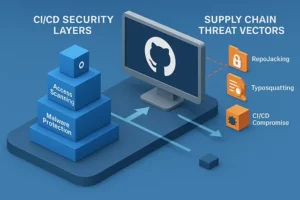Avoiding Scams on Social Media Platforms

These days, social media is part of our everyday lives. We connect with friends, share thoughts, photos, important events, and sometimes, our deepest secrets. As wonderful and liberating as this digital village might be, it has a dark side where scam artists lurk, ready to exploit and deceive. Here, we’ll discuss common scams on popular platforms and provide you with valuable tools to shield yourself from getting entangled in the web of fraudsters.
Remember, knowledge is power. Being aware of what lurks in the shadows can make all the difference in the world of social media. Nothing ruins a good online experience faster than falling victim to a scam.
Scamming techniques are continually evolving, making it essential to stay informed. Hence, prepare to dive into a comprehensive list to arm yourself against the tricks and guiles of these crafty con-artists.
- Identity Theft Scams: Your personal information becomes a goldmine for fraudsters.
- Financial Fraud Scams: Scammers posing as a friend or a reputable company to siphon off your money.
- Romance Scams: Love-blind victims willingly part with their money, believing they are helping a significant other.
- Lottery or Prize Scams: The illusion of a ‘big win’ is dangled to trick users into parting with their cash or personal information.
- Job Offer Scams: A fake job listing used to hook unsuspecting job searchers.
In the course of this article, we will explore these scams in much more detail and importantly, how you can protect yourself from becoming a victim.
Table of Contents
Recognizing Fake Profiles and Accounts
Like a tricky tongue twister, recognizing fake profiles and accounts can sometimes be a challenge. Social platforms have become a hub for imposters who appear genuine at first glance! But don’t worry, we’re here to help you untangle this web of deceit.
Remain vigilant on social media. Start by examining the account’s profile picture. Is it a stock image or a celebrity’s photo? Be skeptical! Social media scammers are known for using eye-catching or familiar images to lure unsuspecting followers.
Next, take a peek at their followers list and posts. If the account has only a handful of followers or if the posts are sparse and irregular, raise an eyebrow. Legitimate accounts usually have a robust social media presence with consistent, meaningful engagement.
Remember: “When in doubt, do a bit of digging!”
Also, pay close attention to the bio section of the profile. It’s a hotspot for red flags! Keep an eye out for vague descriptions, repeated use of keywords, or accounts claiming to be ‘official’ without any verification checkmark.
Let’s not forget about direct messages. Be suspicious of those sending unsolicited messages or requests, they might be trying to trick you into revealing sensitive information.
- Examine the profile picture: Check if it’s a stock photo or a familiar image.
- Review the follower list and posts: Sparse followers and irregular posts are a red flag.
- Pore over the bio: Vague descriptions and repeated keywords can be signs of a fraudulent account.
- Scrutinize direct messages: Be wary of unsolicited messages or requests.
Staying safe on social media doesn’t need to be daunting. With this knowledge, you’re now ready to spot the fakes. Let’s keep our social media experiences safe, fun and authentic!
Identifying Phishing Scams
Understanding how to spot phishing scams is key to ensuring your safety on social media. What exactly are they? These are deceptive tactics that scammers use to trick you into sharing your personal information or login credentials. The dangers involved cannot be understated. So how do you stay one step ahead of these cybercriminals? Allow me to guide you. Let’s dive right in!
Phishing scams usually take the form of deceptive messages or posts. At first glance, they might seem harmless, but they have a misleading nature designed to steal your sensitive information. Spotting them is crucial to your wellbeing online.
- Email communication: Oftentimes, phishing scams make their way to you through email pretending to be from large corporations or social media platforms. Here’s a tip – if the email asks you to share your login credentials or other sensitive information, take a moment, it’s probably a phishing attempt.
- Unsolicited friend requests: Phishing attacks also can arrive as friend requests from strangers or cloned profiles of your friends. If the individual begins asking for personal information or sends suspicious links, proceed with caution.
- Suspicious links or attachments: Messages with links to download files or suspicious URLs are often phishing attempts. Avoid clicking on these at all costs until you’ve verified their source.
Remember, when in doubt, reach out! I cannot stress this enough. If you’re unsure about an email, message, or friend request claiming to be from a trusted source, contact the organization or the friend directly to confirm.
“An ounce of prevention is worth a pound of cure” – Benjamin Franklin
And this couldn’t be truer when it comes to preventing phishing scams. Investing a little time in being cautious now can save you from a big headache later.
Take control – Secure your privacy settings
Don’t wait for a scammer to strike. Take control of your privacy settings on your social media accounts. Make sure to limit the amount of personal information visible to the public and be selective in accepting friend requests, especially from people you don’t recognize. You’re the captain of your online presence.
In the end, awareness is your best defense against phishing scams on social media. Stay vigilant, stay informed, and always err on the side of caution.
Spotting Fake Giveaways and Contests
Have you ever seen a post promising you the latest iPhone or a luxury vacation, all for simply liking, sharing, or clicking a link? Regrettably, these giveaways are frequently engineered by scammers to get your personal information, spread malware, or trick you into purchasing non-existent products or services.
Here’s how to distinguish the real from the fake:
- Instant wins: Real contests take time, often weeks or months, before announcing a winner. If you’re told you’ve won instantly, be sceptical.
- Too good to be true: If an offer sounds too good to be true, it probably is. Especially if the brand or contest is promising overly extravagant prizes, think twice.
- Non-official accounts: Always check if the giveaway is being conducted by a verified account. Fake accounts often try to mimic real organizations or individuals but lack the verification badge.
Even equipped with this knowledge, it’s easy to be tricked by sophisticated scams, but there are additional measures you can take to protect yourself:
- Investigate the profile: If it’s a new account with few followers and posts, it’s likely to be fake.
- Watch out for misspellings: Grammatical errors, awkward phrasing, or incorrect spelling are often signs of a scammer.
- Don’t provide personal information: Never share sensitive personal or financial information to participate in a giveaway or contest.
- Verify the URL: Be wary of shortened URLs as they can lead you to risky websites. Always check the full URL before clicking.
Stay alert and informed, and remember, if something feels off, it’s better to be safe than sorry. Always conduct a quick validity check and trust your instincts. Your online safety is paramount.
Avoiding Investment and Money-Making Scams
It’s essential to be wary of investment and money-making scams that lurk on social media platforms. The allure of earning quick money or receiving high returns on investments can be tempting. But trust us, if it sounds too good to be true, it probably is. Here are
Notably, investment and money-making scams are among the most prevalent on social media platforms. They are cunning, designed with the purpose of pulling you in with promises of high returns for low-risk investments. The enthralling success stories plastered all over their profiles can make it quite challenging to resist. But resist you must, and we’re here to guide you on how to do exactly that.
Firstly, be cautious of pressure tactics. Perpetrators of these scams often try to rush their targets into making investment decisions. They might warn you about missing out on an incredible opportunity if you don’t invest immediately. Remember, legitimate investment opportunities will never pressure you into making a rushed decision.
Secondly, research is paramount. The National Futures Association (NFA) and the Financial Industry Regulatory Authority (FINRA) all provide tools for checking the credibility of investment opportunities. Make use of these resources to avoid falling for sham investment opportunities.
Lastly, if it sounds too good to be true, it probably is. This age-old adage holds especially true in the fast-paced world of social media, where havens of quick profit often turn out to be nothing but mirages of deception.
A good rule of thumb is to approach investment opportunities with a healthy amount of skepticism. It’s far better to miss out on a potential opportunity than to lose your hard-earned money to a con artist on social media.
Actions to Take if You Have Been Scammed
The fact remains: even the savviest of us can fall victim to scams. If you find yourself in such a situation, don’t panic. There are actions you can take to alleviate the damage.
- Report the scam immediately: Most social media platforms have mechanisms for reporting fraudulent activities. Make sure to provide as much information as possible to aid their investigation.
- Contact your financial institution: If you shared any banking information or made any payments, reach out to your bank immediately. They can provide advice, stop further transactions, and sometimes even reverse a transaction.
- Alert law enforcement: Cybercrime is still a crime. Report your experience to your local law enforcement agency.
Throughout this ordeal, remember that you are not alone. There are many resources and organizations available to help. Learning from this experience will bolster your defenses against future scams.
Protecting Personal Information on Social Media
Protecting your personal information on social media is highly important. By being vigilant you can ensure that your private details remain exactly that -private. Here’s how you can achieve this:
- Only share with those you trust: Not everybody needs to know every detail about your life. Remember, sharing excessive information with people you barely know could just be an open invitation to hackers and identity thieves.
- Employ strong and unique passwords: Using memorable dates or names might seem like an easy solution, but it’s also easy for scammers. Instead, opt for a mix of characters, including uppercase, lowercase, numbers, and symbols. Avoid using simple passwords like ‘password’ or ‘123456’.
- Two-step authentication: Utilize two-step authentication wherever possible. This is a secondary level of protection that typically involves receiving a code to your mobile device.
- Think before you click: Before clicking on a link, double-check the source. Treat every unsolicited email, text, or post with suspicion and don’t click on any links without verifying their authenticity.
It’s also crucial to remember that your email account is the main door to your identity online. If someone is able to access your email, they can easily reset your other account passwords and pretty much own your digital presence. Therefore, ensure your email is as secure as possible.
Keeping Safe From Scam Direct Messages
Direct messaging scams, even on social media, can look eerily similar to messages from trusted contacts or companies. Regardless of where the message comes from, don’t share sensitive information like passwords, bank account details, or your social security number. Always remember the golden rule – if something seems too good to be true, it most probably is.
In summary, always play it safe when it comes to social media. Understanding the risks and how to manage them is the first step to maintaining your online security and protecting your personal information. Stay vigilant and you will significantly decrease your chances of falling victim to an online scam.
Read More : Tackling Cyberbullying in the Age of Social Media







